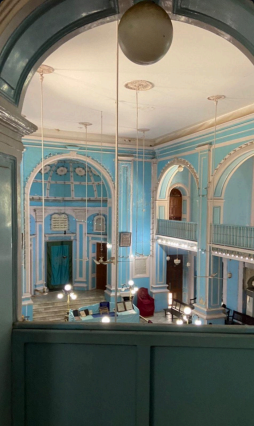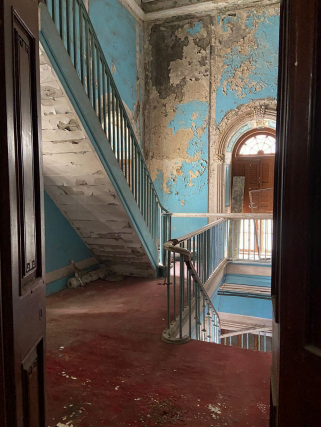Magen David Synagogue: A story of the Jewish community through the tides of time.
- Vidushi Lal
- Feb 10
- 5 min read
Updated: Apr 4
Interiors of the Magen David Synagogue (above & right).

Tucked away in Byculla’s busy by-lanes lies the Magen David Synagogue. Despite its beautifully carved interiors and rich history, it often goes unnoticed by many. and those who regularly visit it are far and few. The Magen David Synagogue’s arctic blue edifice stands out from the chalky grey buildings that envelope it.
In 1861, in Byculla’s Nagpada, a site was chosen between the intersection of Sir. J. J Road and Sofia Zubair Road, and the Sassoons brought the Magen David Synagogue to fruition.
Its blue exterior deeply resonated with Byculla’s inhabitants. Despite its centrality, most inhabitants could not pinpoint the synagogue’s exact location, although the historical significance to Bombay's Jewish community were mentioned.
Jews in Bombay
Mumbai, a city that is praised for its cosmopolitanism is also home to the Bene Israeli and Baghdadi Jew community. The community’s presence can be dated back to as early as the 17th century. The Jewish community forged links with the Portuguese and the community was able to settle into trade and occupy a prominent position quickly. As the years went by, India saw the immigration of Jews from countries like Iraq and Yemen owing to the ease of business and trade in India. Many of these Jews lived around Surat, Gujarat but scholars like Joan G. Roland have pointed out that the decreasing relevance of the Surat port influenced Jews to move to the city of Mumbai (then, Bombay). Today, the Bene Israeli community is the one that is predominant in Mumbai although Jews exist in clusters even in places like Cochin. After the formation of Israel in 1948, thousands of Jews moved to Israel, leaving just 5,000 Jews in India today. Against the larger demographic of India, the Jews form a small community. While the unawareness regarding the Magen David Synagogue is understandable owing to the community’s invisibility in the city, it remains surprising how such a prominent blue edifice steeped in history goes unnoticed.
The Sassoons and their magical pencil
In Mumbai, the surname Sassoon rings a bell. One is reminded of the David Sassoon Library as well as the Sassoon Docks that serve as a fishing hub. The Sassoons were an influential lot who invested their opulence in the cultural and educational facilitation of the Jewish community in Mumbai (then, Bombay). Researcher Joan G. Roland in her book The Jewish Communities of India: Identity in a Colonial Era, discusses the migration of Jews to Bombay in the latter half of the 1860s, influenced by the opportunities provided by the Sassoon family. She notes that the Sassoons were instrumental in establishing various institutions and businesses in Bombay, which attracted Jewish migrants seeking employment, education, and better living conditions. Researcher Shavia Weil writes that this synagogue in Byculla was especially important because it guaranteed an open space in front of the synagogue for the community to gather and organize events for the community. The synagogue’s blue edifice with its classically inspired beams and flat roof was funded entirely by David Sassoon. For its inauguration, David Sasson read out a part of the Psalms and this was noted as a moment of celebration for the Jewish community as they were finally gaining prominence in Bombay (now, Mumbai) and the synagogue was a result of their wish for a space for worship in Bombay (now, Mumbai). Today, the 159-year-old synagogue is managed by the Sassoon Family Continuation Trust which is also responsible for the management of the Knesset Eliyahoo Synagogue in Kala Ghoda. Mr. Rajkumar Jha, an official at the Sassoon Trust said that mass is conducted every Friday morning, Saturday morning, and Sunday evening at both the synagogues in Mumbai. Another caretaker of the Magen David Synagogue remarks, “There aren’t enough people to congregate for mass today”. When one thinks about the cultural importance of David Sassoon’s recitation of the Psalms at the inauguration of the synagogue, the caretaker’s statement about the dwindling community at the Magen David Synagogue sticks out sourly.
Today, even non-Jewish visitors are permitted to enter the Magen David Synagogue for Rs. 300 per person. According to Rajkumar Jha, this amount is redirected to an organization that monetarily supports cancer patients. Such initiatives fall in line with the Philanthropic values that the Jewish community lives by.
The Magen David Synagogue today

(The ruined interiors of the Magen David Synagogue in Byculla)
The Magen David Synagogue’s vibrant blue exterior stands in stark contrast to its neglected interior. While the striking blue façade still reflects the synagogue’s cultural significance, the interior has fallen into disrepair. Despite being managed by the Sassoon Family Continuation Trust, the synagogue urgently needs restoration. This contrast between its beautiful exterior and deteriorating interior highlights the fading presence of a once-thriving community and the ongoing challenges of preserving its legacy.
In 2010, an American Jewish businessman Mosher Levy donated Rs. 75 lakhs as a donation to the trust However, 14 years later, the synagogue’s interior is now calling for another careful restoration. The caretakers at the Magen David Synagogue remarked that the dwindling community may also be one of the reasons behind the present state of the synagogue. The synagogue’s interiors reflect negligence in terms of upkeep and care and Mumbai monsoon’s wrath is bearing heavily on the interiors of the century-old synagogue. With not as many members congregating for a mass to be held, the synagogue is losing its centrality in people’s cultural imagination. Today, members of the Jewish community in Mumbai have begun to move back to Israel as a “return to their homeland”, weakening their demographic in Mumbai. In the context of the ongoing Israel-Palestine conflict, this becomes especially poignant. Isaac Elijah Cohen (64), one of the last few Bene Israeli Jews still living near the Magen David Synagogue, walks past its iconic blue walls every evening. The sight fills him with both pride and sorrow. Pride because the synagogue stands as a symbol of the community's once-thriving presence in Mumbai. Sorrow because, after 159 years, it is now a shadow of its former self. "We’ve tried to maintain it," Isaac explains. "Donations like the one from Mosher Levy helped a decade ago, but maintenance is an ongoing effort. It is not just about money—it’s about people. Without a thriving community, even the most beautiful structure begins to crumble. The Sassoons built this synagogue for a community that no longer exists in the same way. The community that gave this synagogue life is scattered. Rivka Abraham (58) another Bene Israeli community member adds a critical observation about the synagogue’s role in the modern context. "With no fixed timings for mass and no official head to oversee its operations, there’s a lack of direction. People do not feel the same connection. We need someone who can bring the community together, even if it is just a handful of us. Without leadership, we’re just drifting."
The present condition of the Magen David Synagogue in Byculla is emblematic of the loss of Mumbai’s oldest and most culturally vibrant communities in Mumbai’s cultural milieu.

Comments